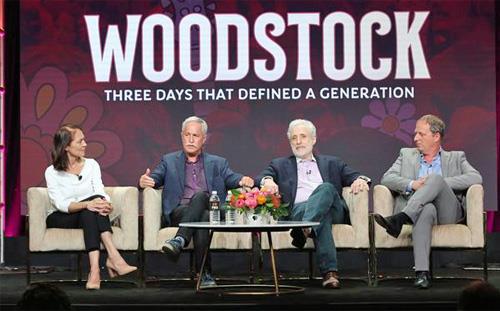
If Michael Wadleigh’s original 1970 Woodstock documentary concentrated on the music of the iconic rock festival, making stars out of Joe Cocker, Santana and Sha Na Na, a new 50th-anniversary look at the event turns its focus largely away from the stage.
Barak Goodman’s Woodstock: Three Days that Defined a Generation, which premieres on PBS Tuesday at 9 p.m. ET (check local listings) concentrates on the youthful throngs that made it to farmland in Bethel, N.Y., the wary locals who eyed the invasion (and prevented it at other sites), the colorful commune dwellers enlisted to help out, and ultimately the townspeople who pitched in to help host the young visitors.
With a wealth of previously unseen footage (as well as some glimpses of the storied music), the documentary is mixed with new audio-only interviews to preserve a memory of the communal event apart from what people have stuck in their mind from that first documentary.
“Frankly, those who were there and people who weren’t there but sort of think they might have been there remember what they remember from the movie — including some of the staff, some of the people I interviewed,” Joel Makower, author of Woodstock: The Oral History and a source for the new film, told critics at the TV Critics Association summer press tour.
In fact, he added, many of his interviewees told him, “I don’t remember the music. I learned mostly about it in that movie.”
Indeed, even Joel Rosenman, who conceived and coproduced the festival, admits, “I didn’t see much of the performances. We were far too busy to enjoy ourselves in the audience.
“What I saw was an event taking place with far too many people,” Rosenman said. It was so many people, “it looked like all of the counterculture.”
The crowds may have been rain-soaked and muddy, with no food in sight, Rosenman said, “they were having the time of their lives. They banded together under this adversity, and it reminded me of some of the things that we have to band together about today. And I didn’t really get a sense of that while I was there, because I was panicked. Until I saw Barak’s film. Barak really captured how they felt about it, from a point of view that I was not treated to until I saw his film.”
“These kids weren’t by and large hardened hippies,” filmmaker Goodman said. “They weren’t revolutionaries who had marched in the streets. They weren’t particularly political. They were young college kids, for the most part, even high school kids, some of them.”
Still, by their actions they represented the counterculture values of the late 1960s, he said. “I don’t think it was any 500,000 people who would have behaved the way they did peacefully, sharing with each other, getting each other through unless they had come to that concert already with these values in their hearts.”
And they carried those values with them the past half-century, Goodman said. “Those kids, many of whom are now in their 70s, will tell you that that event changed them or reinforced what they already believed, but they held onto it as they go out into the world and do what they do in their lives. So I do think it, in many ways, defined a generation.”
It makes sense, then, to turn away from Sly and the Family Stone, the Grateful Dead, the Who, and The Band, to show those people in the fields, dressed and undressed (and subsequently blurred for public television viewing).
“Our film really distinguishes itself from the Wadleigh film because we had access to all this never before seen footage, so you’re really out there in the crowd,” said Susan Bellows, senior producer at American Experience. You’re experiencing this event with the people in the concert, and they are really very, sort of, front and center,”
Woodstock: Three Days That Defined a Generation premieres onAmerican Experience Tuesday Aug. 6 at 9 p.m. ET (check local listings).